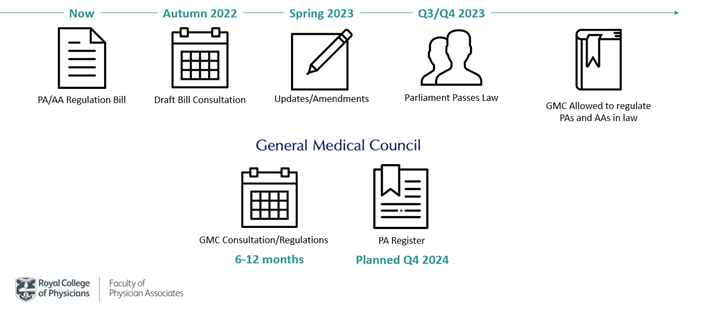Physician associate regulation
To understand the road to regulation, visit our regulation information page.
At the present time, the Medical Act (1983) is the law that provides the General Medical Council (GMC) to hold a register of medical practitioners, the legal name for medical doctors. At the present time, the GMC is only able to regulate doctors. In 2019 the government committed to introducing regulation for PAs, and since then the Department for Health and Social Care (DHSC) has been drafting legislation to enable the GMC to introduce statutory regulation of PAs and AAs.
In July 2022, the DHSC set out a new timetable for regulating PAs and AAs. The first step in that timetable for the introduction of this legislation is a public consultation, where members of the public can comment on draft legislation. The consultation is open for 3-months to allow sufficient time to review, analyse and respond. The government committed to opening the public consultation on AA/PA regulation in the Autumn of 2022.
Following the closure of the public consultation, the DHSC will review responses and make any necessary changes as indicated. The DHSC will then lay the AA/PA regulation legislation before the government, to pass into law. This is expected to take place in the summer of 2023. Once the law has been changed, the GMC is able to introduce regulation for PAs.
The GMC will then need to review the legislation as approved by the government and consult within the GMC about changes in the way in which the GMC operate given new laws. They will also establish how the PA register will appear, amongst other things. This is expected to need around 12 months to introduce the necessary changes within the GMC. As such, it is expected that the GMC will be able to open a register for regulating PAs towards the end of 2024.
The legislation is subject to parliamentary time. At a time of political instability, with many recent changes, the work of government and the DHSC continues to be guided by the Secretary of State for Health and Social Care, as well as other political and national issues. The FPA and RCP continue to work with the GMC, DHSC and other stakeholders to make the case that there should be no further delays in introducing PA regulation.
The below timeline illustrates the journey ahead.
